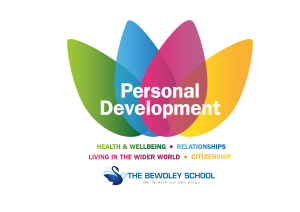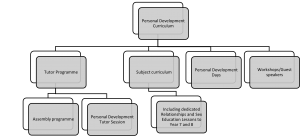Personal Development
Ethos and Aims
Personal Development is a programme aimed to prepare our students for a safe, healthy and successful adult life. 
We have divided our Personal Development programme into 4 strands: Health and Wellbeing, Relationships, Living in the wider world and Citizenship. We have created a logo that we use on all of our resources to show these 4 strands. As outlined later in this document, Personal development isn’t taught as a separate subject, but is embedded throughout the curriculum. By having this logo (right), it helps students to know when they are covering the PD content.
Staffing
Mrs C Jones – Head of Personal Development
Mrs S Korischar – Careers lead and RSE Teacher
The whole teaching team plays an active role in delivering the Personal development programme as outlined in the implementation section; a large proportion of which is through the tutor programme in addition to these key subject areas: Personal development, Maths and Science.
Intention
We aim to help pupils become responsible, respectful and active citizens who are able to play their part and become actively involved in public life as adults. The programme is designed to develop and deepens pupils’ understanding of the fundamental British values of democracy, individual liberty, the rule of law, and mutual respect and tolerance. We aim to promote equality of opportunity so that all pupils can thrive together, understanding that difference is a positive, not a negative, and that individual characteristics make people unique. This includes, but is not limited to, pupils’ understanding of the protected characteristics and how equality and diversity are promoted. We hope our programme gives pupils the qualities they need to flourish in our society and recognise the importance of developing pupils’ confidence, resilience and knowledge so that they can keep themselves mentally healthy. We work hard to help pupils recognise online and offline risks to their well-being and enables pupils to recognise the dangers of inappropriate use of mobile technology and social media. It develops pupils’ understanding of how to keep physically healthy, eat healthily and maintain an active lifestyle, including giving ample opportunities for pupils to be active during the school day and through extra-curricular activities. It develops pupils’ age-appropriate understanding of healthy relationships through relationships and sex education. We also ensure that our Personal development programme supports readiness for the next phase of education, training or employment so that pupils are equipped to make the transition successfully through careers information education, advice and guidance
Our Personal development programme is embedded throughout the curriculum and our tutor programme rather than being taught as a separate subject. We feel this is the best approach for our students to ensure that where possible our students are taught by experts in the field. Figure 1 gives an overview of how this is achieved.

Implementation
Once a week, students attend an assembly focussed on one aspect of the PD programme. This is followed up by a Values@Bewdley session the following day to consolidate and review key points made in the assembly from the previous day. The assembly rota is personalised to each year group which are run by SLT, Heads of year and other key members of staff or guest speakers. Each V@B session also links to one of the Bewdley Values which are Polite, Prepared, Punctual, Caring, Ambitious and Resilient.
Students also have one 20 minute Personal Development session which focusses on a half termly theme. This theme is the same for the whole school but each year progresses and builds on what was taught the previous year. Autumn 2 for examples has the theme of Healthy relationships, where year 7 start by looking at friendships and the meaning of relationships before looking at bullying in year 8 and racism, sexual harassment and assault in year 9. This then progresses on to looking at coercive control in year 10 and Domestic abuse in year 11. Table 1 outlines the current themes and topics taught within these topics but we continue to update and improve these as the programme develops. All of the resources are fully prepared for staff making it easier for staff to deliver the content and ensuring the quality and delivering is the same across the school.
Students at KS3 have one dedicated Personal Development lesson each week in years 7-9. All of the resources are pre-planned for the teachers delivering this content, ensuring all students received the same high-quality lessons. Within these PD lessons, students have Sex and relationships lessons which have been put together with the careful guidance of Kate Wilson, Health promotion specialist for Worcestershire NHS who we have worked closely with to ensure our content is age appropriate and meets the needs of our young people. These lessons are taught in single gender groups by 2 members of staff.
Some topics are also taught through subjects. This enables us to make use of staff’s specialist knowledge. For examples, the maths department deliver our KS4 finance education, Science deliver lessons on drugs, vaccines and health and the History department teach the content related to law democracy. Again, all of the resources are pre-planned for the teachers delivering this content, ensuring all students received they same high quality lessons.
At KS4, students continue to receive the PD programme through the tutor programme but covering it within the subject curriculum becomes more challenging as students select options and do not all cover the same curriculum. It is for this reason that some content is therefore covered in 6 drop down days across the year. On these days, the whole of year 10 are taken off timetable to attend a series of workshops related to key PD topics on 4 of the days and on 2 days students attend community action.
Impact
The full impact of our Personal development programme will not be assessable during their time at school but we do use a range of methods to measure the impact of what we are doing where possible.
This takes the form of google forms after most workshops, guest speakers or other activities involving external agencies. We use this as a way to find out what they learnt from the activity but also find out how they think it can be improved in the future. This helps us to continuously improve our programme.
The school governors also meet with students to assess how will the programme in running and SLT members together with Mrs Jones carry out learning walks regularly.




